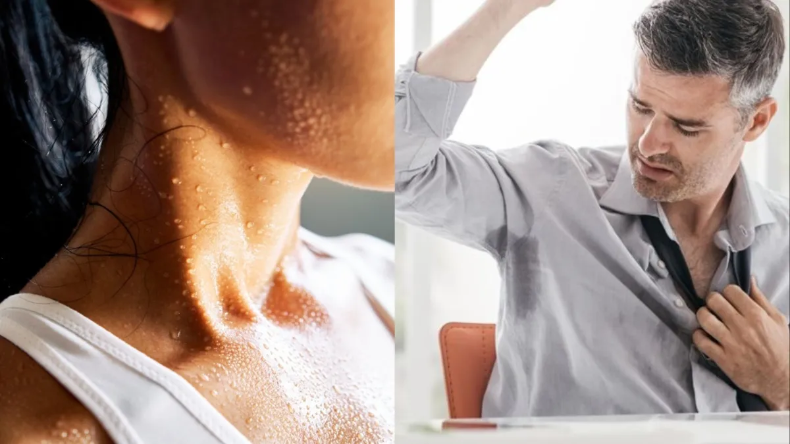Sweating is a natural process that helps the body stay cool. But in summer, too much sweat can cause many skin problems. It can block pores, cause pimples, rashes, itching, and even infections. That’s why it is important to take care of your skin properly during the hot season. This article will explain simple and effective ways to protect your skin from sweat-related damage in summer.
Why Sweat Can Harm the Skin
Contents
- 1 Why Sweat Can Harm the Skin
- 2 1. Clean Your Skin Regularly
- 3 2. Exfoliate Once or Twice a Week
- 4 3. Wear Loose and Breathable Clothes
- 5 4. Use Sunscreen Daily
- 6 5. Apply Talcum or Antifungal Powder
- 7 6. Stay Hydrated
- 8 7. Use Light Moisturizer
- 9 8. Take Showers After Sweating
- 10 9. Avoid Heavy Makeup
- 11 10. Use Home Remedies
- 12 Final Words
- 13 Latest Updates
Sweating by itself is not harmful. But when it mixes with dust, oil, and bacteria on the skin, it can cause many problems. Some common skin issues caused by sweat in summer are:
- Acne and pimples
- Heat rashes (prickly heat)
- Fungal infections (especially in underarms, neck, thighs)
- Itching and irritation
- Bad body odor
1. Clean Your Skin Regularly
Washing your face and body regularly helps remove sweat, dirt, and oil. Use a gentle face wash or soap that suits your skin type.
- Wash your face 2–3 times a day with cold water.
- Use mild, chemical-free soap for your body.
- After sweating a lot, take a shower to prevent skin infections.
2. Exfoliate Once or Twice a Week
Sweat can block your skin pores. To clean dead skin cells and open pores, exfoliate gently once or twice a week.
- Use a soft scrub for your face.
- For the body, use a loofah or gentle body scrub.
- Avoid harsh scrubs—they can damage your skin more.
3. Wear Loose and Breathable Clothes
Tight clothes trap sweat and cause irritation or rashes. In summer, wear light and airy clothes made of natural fabrics like cotton.
- Avoid synthetic clothes as they do not absorb sweat.
- Change clothes after working out or sweating a lot.
- Keep underarms, groin, and feet dry to prevent infections.
4. Use Sunscreen Daily
Sweat can increase the chances of sun damage. Always apply sunscreen before going outside.
- Choose a sunscreen with at least SPF 30.
- Use waterproof or sweat-resistant sunscreen.
- Reapply every 2–3 hours if you are out in the sun for long.
5. Apply Talcum or Antifungal Powder
In areas that sweat a lot like underarms, thighs, or neck, you can use talcum or antifungal powder.
- It keeps the area dry.
- Helps avoid itching and fungal infections.
- Use it after bathing and before sleeping.
6. Stay Hydrated
Drinking enough water is very important in summer. It keeps your skin healthy from the inside.
- Drink at least 8 to 10 glasses of water daily.
- You can also drink coconut water, lemon juice, or buttermilk.
- Avoid too much coffee, tea, or soft drinks—they can dehydrate you.
7. Use Light Moisturizer
Some people think they should skip moisturizers in summer, but that’s not true. Even in hot weather, your skin needs moisture.
- Choose oil-free or water-based moisturizers.
- Apply after washing your face or taking a bath.
- It helps in healing and protecting the skin barrier.
8. Take Showers After Sweating
After working out or coming home from outside, always take a shower to remove sweat and bacteria.
- Use a gentle body wash.
- Dry your skin properly with a clean towel.
- Don’t stay in wet or sweaty clothes for long.
9. Avoid Heavy Makeup
In summer, heavy makeup can block pores and mix with sweat, causing acne and breakouts.
- Use light or no makeup if possible.
- Choose non-comedogenic products (that don’t block pores).
- Remove all makeup before going to bed.
10. Use Home Remedies
Some natural remedies help soothe sweat-related skin problems:
- Aloe vera gel: Soothes and cools the skin.
- Cucumber juice: Reduces heat rashes and hydrates the skin.
- Multani mitti pack: Controls oil and sweat on the face.
Final Words
Sweat is a part of summer, but you can keep your skin safe and healthy with simple care. Wash regularly, wear clean clothes, drink water, and avoid using harsh products. If you face serious skin problems like infections or painful rashes, always consult a skin doctor.







